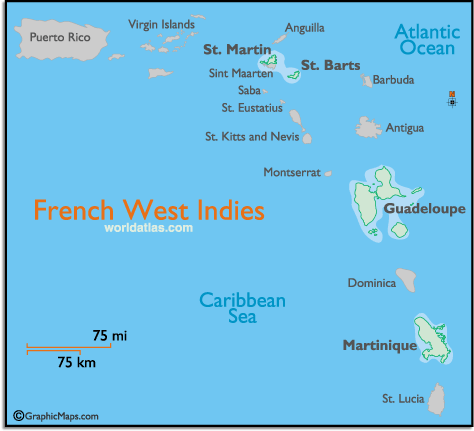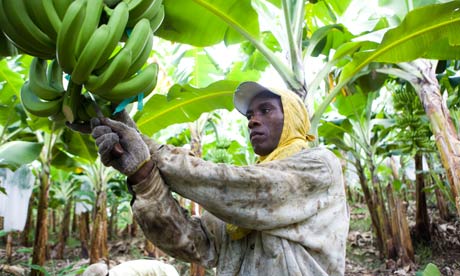What's Poisoning Martinique's Men? Toxin Cancer Health Epidemic Spreading in West Indies Paradise
Last edited Thu Oct 29, 2015, 01:35 PM - Edit history (1)
 ?
?
- A Preventable Health Epidemic is Spreading in Paradise, Thanks to a Now-Banned Pesticide -
From the outside, the French Caribbean island of Martinique looks like a paradise: turquoise waters beneath colorful wooden houses that climb up lush green slopes of banana leaves. Life seems pretty laid-back-- no one expects Martinique to lead the world in any rankings.
But this Caribbean island does lead the world in one dark, tragic metric: PROSTATE CANCER RATES.
According to the World Cancer Research Fund International, in Martinique: For Every 100,000 Men, 227 Have Prostate Cancer.
That number is almost twice the rate of the second country on the list: Norway (129). The Unites States, by comparison, comes in at No. 14, with 98 incidents per 100,000.
And Martinique's is an outlier result that looks even more eyebrow-raising when you run comparisons to figure out why.
>snip But some doctors have come up with a damning diagnosis: those green slopes of banana leaves. Turns out, they're a little too green. The high cancer rate in Martinique is being linked to PESTICIDES, primarily used in banana plantations to combat weevils.
According to the 2009 paper, research found that the islanders' connective tissue was being contaminated by "extremely high levels" of a nasty cocktail of "DDT, DDE, alpha, beta and gamma HCH, aldrin and dieldrin."
The paper concludes that ENVIRONMENTAL FACTORS such as "intensive prolonged exposure to carcinogenic, mutagenic and reproductive toxin pesticides" may be the culprit.
One of the lead authors of that paper, Dr. Dominique Belpomme, professor of clinical oncology at the Paris University Rene Descartes, was asked in 2007 by politicians of Martinique to give advice on the health effects of 'CHLORDECONE' pollution- also called 'KEPONE', a colorless pesticide related to DDT. Chlordecone is so TOXIC that in 2011, it was banned globally by the Stockholm Convention on Persistent Organic Pollutants.
"But today, unfortunately, chlordecone was replaced by the use of other toxic pesticides," he tells OZY, "so there's no end to POLLUTION." As Dr. Belpomme points out, "the pesticides might also be linked to women with breast cancer and children with congenital malformations."
Now, concerned citizens of Martinique believe the chemicals have poisoned their ENTIRE FOOD CHAIN, PLUS their rivers and coasts.
Read more, 'What's Poisoning Martinique's Men?', Yahoo News, Oct. 27, 2015.
http://news.yahoo.com/whats-poisoning-martiniques-men-080000925.html

appalachiablue
(41,102 posts)- NIH, PubMed, 'Prostate Cancer as an Environmental Disease: An Ecological Study in the French Caribbean Islands, Martinique and Guadeloupe', 2009. http://www.ncbi.nlm.nih.gov/pubmed/19287960
- World Cancer Research Fund International, 'Prostate Cancer Statistics', 2012.
*CHART of World Ranking by Country, 1-20.
http://www.wcrf.org/int/cancer-facts-figures/data-specific-cancers/prostate-cancer-statistics
KT2000
(20,567 posts)As alarming as this is, environmental health research rarely makes its way into the medical mainstream. That must be changed.
appalachiablue
(41,102 posts)effects of the product and how it was banned in the US and France but permitted on the 2 Antilles islands. The public needs to know more about this kind of reckless use of poisons for profit that causes such major harm I agree. Even more since regulations have been dramatically lifted by our corrupted federal oversight agencies in the last 30+ years.
The damage done to the local citizens, habitat and agricultural based economies of Martinique and Guadeloupe is criminal. I visited Martinique briefly while staying on St. Lucia and love the beautiful Caribbean.
Wiki, French West Indies/Caribbean
https://en.wikipedia.org/wiki/French_West_Indies

appalachiablue
(41,102 posts)Last edited Fri Nov 6, 2015, 04:55 PM - Edit history (3)
France is once again embroiled in a health and safety scandal. For 20 years, from 1973-1993, the insecticide CHLORDECONE (Kepone) was used in Martinique and Guadeloupe, in the French West Indies, to combat banana weevil, exposing a significant proportion of the population and polluting the soil.
A study publication last month in the Journal of Clinical Oncology and in Guadeloupe confirms that chlordecone, which disrupts the ENDOCRINE SYSTEM, is responsible for a significant increase in the risk of PROSTATE CANCER, the cause of half the cancers found on the two islands.
"Huge MISTAKES were made, horribly reminiscent of the key public health issues of the 1980s and 1990s, particularly growth hormones and BSE", says Professor William Dab, the head of the Science Committee for the Martinique and Guadeloupe Chlordecone Plan. The product was BANNED from mainland France in 1990, but special provision was made for its use to continue in the Antilles until 1993. It had been banned in the US since 1976.
> Martinique and Guadeloupe must now cope with MASS CONTAMINATION of soil, river water and sediments by a substance that REMAINS TOXIC FOR CENTURIES.
>"About 80,000 people live in areas where the soil is contaminated and 13,000 absorb more chlordecone than the reference dose per day, simply by EATING THEIR OWN VEGETABLES. We must help local people learn how to live with a problem which is here to stay: the HALF-LIFE of chlordecone is in the ground-- the time it takes half the quantity to disappear--- is 600 YEARS", Dab says.
>The study that was done reveals a substantial increase in the risk of prostate cancer among men exposed to chlordecone. But EATING CONTAMINATED FOODSTUFFS incurs a much higher risk than simply handling the products.
More: The Guardian, "PESTICIDE THREAT LOOMS OVER FRENCH WEST INDIES, MARTINIQUE AND GUADELOUPE", July 13, 2010. http://www.theguardian.com/world/2010/jul/13/france-pesticide-health-scandal-chlordecone
- Sorting and washing bananas in Martinique where chlordecone was used to combat banana weevil.-

